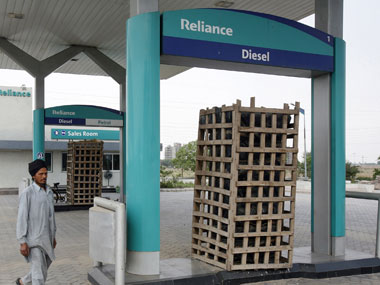The cat is out of the bag. Mukesh Ambani, boss of India’s most cash-rich company, Reliance Industries Ltd (RIL), wants the government to free gas pricing so that he can make even more cash. At last count, Reliance had more than Rs 90,000 crore in cash or cash equivalents.
Wednesday’s newspapers said Reliance has given the government a 90-day ultimatum to reach an “amicable settlement” on a pricing formula for Krishna-Godavari offshore gas since the current prices are below market levels. Firstpost has, in the past, speculated that falling output at the KG fields is linked to Reliance’s unwillingness to accept a government-mandated price.
According to a report in the Hindustan Times, Ambani has charged the government with discrimination, saying it was paying foreign suppliers higher prices while giving it a sub-market price of $4.2 per mmbtu (million metric British thermal units). Landed prices of natural gas are currently in the range of $12-15 per mmbtu - more than three times the price fixed for Reliance.
[caption id=“attachment_186162” align=“alignleft” width=“380” caption=“Mukesh Ambani, boss of India’s most cash-rich company, Reliance Industries Ltd (RIL), wants the government to free gas pricing so that he can make even more cash.”]  [/caption]
In a letter to the petroleum ministry, Reliance said: “This sub-market or below market price for natural gas unfairly discriminates against RIL, particularly as the government is contracting with foreign gas suppliers, either directly or through government agencies (such as Gail, Petronet LNG Ltd, etc), for the supply of natural gas within India at prices which are significantly higher than $4.20/unit.”
But KG gas isn’t the only front Mukesh Ambani has opened against the government. Last month, the company upped the ante demanding freer pricing in the coal-bed methane (CBM) field it has been allotted.
Impact Shorts
More ShortsIn a letter, this time to upstream petroleum regulator Directorate General of Hydrocarbon (DGH), Reliance criticised the government’s guideline saying that it should set prices with reference to a few specific buyers.
According to a report in The Times of India, Reliance told DGH that restricting price discovery to hand-picked users would not be fair. The letter said: “While the government may wish to facilitate supply of gas to some sectors, the approval powers of the government cannot be used to suppress prices of CBM gas below what the market can fetch by restricting price discovery itself. Use of its powers of approval (of the basis/formula of pricing) cannot be used by the government to facilitate the administration of subsidies through preferential pricing to chosen sectors.”
Reliance has two CBM blocks in Madhya Pradesh and Chhattisgarh.
Indications that Mukesh Ambani will be escalating the fight for pricing freedom came as early as June last year, when shareholders at the company’s AGM brought up the issue. At that time, The Economic Times quoted Ambani thus: “Yes, the price of landed gas is $14-16 and (Reliance’s price) is $4.2 (mmbtu). We have understood your sentiments and your board will transmit this (to government).”
A few months ago, Ambani also roped in his partner, British petroleum, to lobby for freer pricing.
BP’s CEO Robert Dudley was quoted by Bloomberg as saying in September that free pricing was the way to go. BP is a 30 percent partner in Reliance’s Krishna Godavari fields.
Reliance has been claiming that KG output is falling due to technical problems. Dudley seemed to back him up and seemed to suggest that more gas means better pricing. “In general, deep water (drilling) requires a lot of capital, it’s a lot of risk. You obviously need to develop mechanisms that’ll create the rewards for all that risk. Over time, free-market systems are what any economy needs to be able to ensure efficient development.”
These developments indicate that Mukesh Ambani is playing for bigger stakes: complete pricing freedom, which the government is loath to do. It has so far not found the gumption to even allow increases in diesel and cooking gas prices to rescue its own oil marketing companies like Indian Oil, Bharat Petroleum and Hindustan Petroleum from bankruptcy.
Reliance has been the prime beneficiary of the government’s policy of fleecing the oil companies to keep petro-goods prices low, since it was free to export at a profit.
Now, it is seeking pricing nirvana in gas which, if given only to Reliance, will have the unintended consequence of allowing ONGC and Gail to bear the consequences of subsidising fertiliser and power companies.
The only logical answer to Reliance’s (not unjustifiable) demand for market-determined pricing is to allow this freedom to all companies and not only Reliance. The subsidies, if any, should be borne directly by the budget.
Reliance has flung the gauntlet. In December, Mukesh Ambani told the government his company would invest Rs 70,000 crore in India. On Wednesday, Ambani’s company announced a plan for share buyback, indicating that he has other uses for his cash too.
In this eyeball to eyeball confrontation between India’s richest industrialist and the government, it remains to be seen who blinks first.
(Disclosure: The author owns some shares in Reliance)


)

)
)
)
)
)
)
)
)



